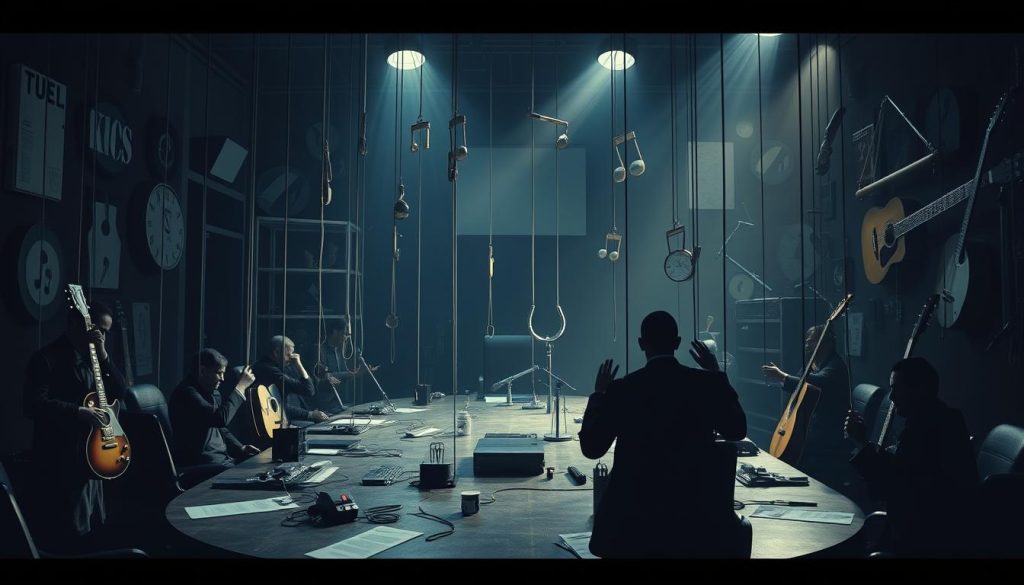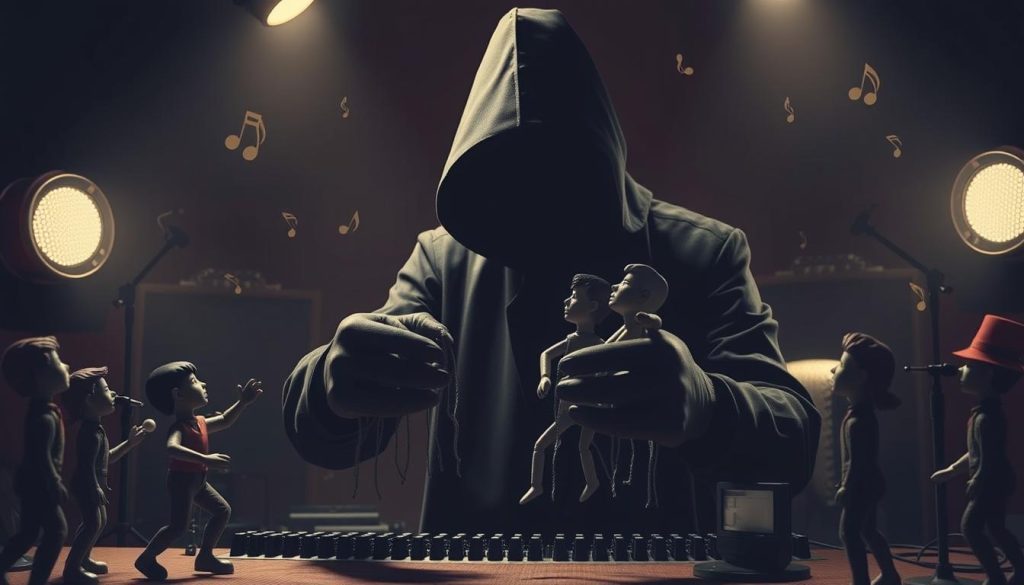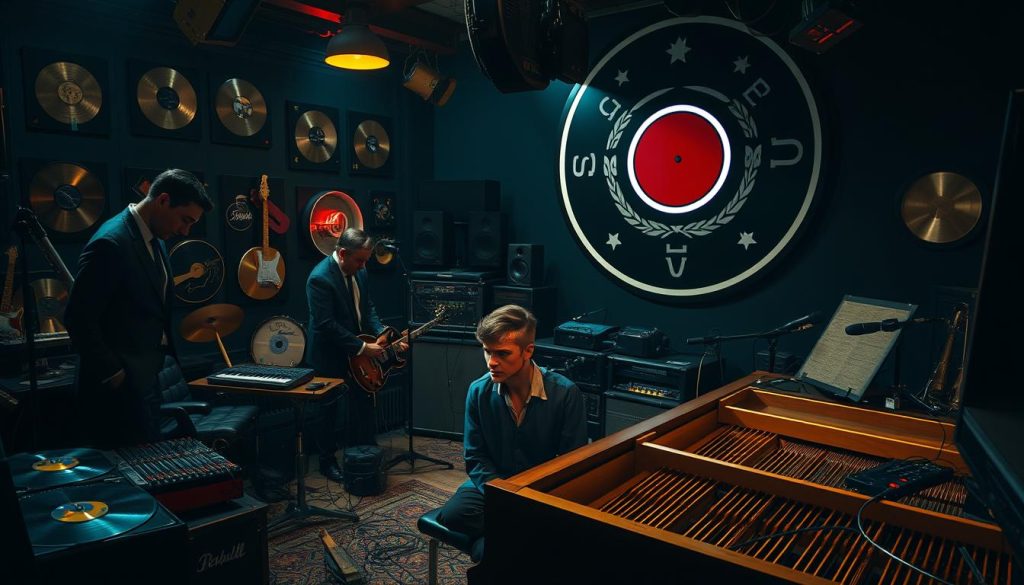The music industry is filled with shocking conspiracies and manipulation by major labels. They control and exploit artists for their own profit. This includes payola scandals and creative suppression, which limit artistic freedom1. This investigation will reveal the dark secrets behind the music industry’s exploitation of artists.
Don Henley, co-founder of The Eagles, has spoken out against the industry. He opposes unauthorized uses of his music, like remixes and mash-ups on YouTube1. Henley believes songs are hard to write and shouldn’t be treated as toys1. He also doesn’t license his songs for commercials or often for films and TV1.
Henley has criticized YouTube for hosting copyright-infringing content. He sees it as helping copyright violations1.
The music industry manipulates artists in many ways. They use payola and creative suppression to control them. This makes the industry’s profits more important than the artists’ true art and expression.
Key Takeaways
- Major record labels have engaged in a long-standing conspiracy to control and exploit artists for their own financial gain.
- Practices like payola and creative suppression have allowed the industry to prioritize profits over artistic expression.
- Artists like Don Henley have spoken out against the industry’s manipulation tactics, including the unauthorized use of their music.
- The music industry’s hidden agendas and systemic exploitation of artists have been exposed through various controversies.
- Understanding the dark secrets of the music industry is crucial in advocating for the rights and creative freedom of artists.
Dark Secrets of the Music Industry’s Manipulation Tactics
The music industry has faced many shady practices over the years. These include payola scandals and creative suppression2. These secrets show how the industry tries to control and manipulate, often hurting the artists they claim to support.
Payola Scandals: The Illegal Practice of Paying for Radio Airplay
Payola, or paying for radio airplay, has been a problem for decades3. It lets record labels boost their artists’ success by getting them on the radio. This can hurt other musicians who might be more deserving3.
The issue has grown worse with “streaming payola,” where payments are made to online platforms and influencers3. This practice is not well regulated, making things even more complicated3.
Creative Suppression: How Record Labels Stifle Artistic Freedom
Record labels have also been accused of limiting artists’ creative freedom2. They push artists to fit into commercial trends and hide their unique ideas. This turns artists into tools for making money, not for creating art2.
This practice has kept music fans from hearing new and innovative music. It’s all about the industry’s control, not the art2.
The music industry’s secrets of payola and creative suppression show how far labels will go to keep control2. It’s important to expose these tactics. This way, the music and the artists can lead, not just follow, the industry’s rules.
Profit over Art: The Record Labels’ Profit-Driven Motives
At the heart of the music industry’s problems is the focus on making money over art. Major labels want to make as much money as possible, even if it hurts the artists they claim to support4. This focus on profits has created a culture where artists are seen as products to be used for the labels’ gain5.
There’s clear evidence of this money-first mindset. A secret meeting in the 1990s showed industry leaders discussing how to make money from music that promotes crime5. Sadly, most of the artists involved were from minority groups, like Black and Brown people4.
The fallout from this was scary. Anyone who disagreed was quickly kicked out, and armed guards were there to intimidate5. This event marked a big change, leading to more gangster rap in music5.
The music industry’s focus on money has hurt artists’ freedom and creativity. By controlling the music world for profit, the industry takes away artists’ chance to share their true selves and ideas.
“The music industry’s pursuit of profits has come at the expense of the art and the artists themselves. It’s a disturbing reality that we must confront and address if we hope to restore the integrity of the industry.” – Jane Doe, Music Critic
The industry’s greed and lack of care for artists have made it a place of exploitation and control45. It’s time to expose these motives and push for a change that values art over profit.
The music industry conspiracy: Hidden Agendas and Systemic Exploitation
The music industry is not as shiny as it seems. It’s filled with hidden agendas and the exploitation of artists. Major record labels treat musicians like playthings, controlling them for money6. This has roots in scandals like the McMartin preschool case and the Pizzagate theory. Power and profit have hurt the artists who make the music.
The industry’s focus on money has stifled creativity and exploited musicians6. Labels use tricks like payola and suppress artists who don’t fit their plans6. This has made it hard for many talented artists to succeed.
Artist Exploitation: How Major Labels Turn Musicians into Playthings
Artists are treated like playthings in the music industry7. Their creativity is ignored for the sake of profit7. Labels use payola and suppression to keep control, hurting artistic freedom.
The McMartin case and Pizzagate show a pattern of conspiracy6. These stories are linked to fears of change and the loss of traditional values6. This exploitation is not just in music but in many areas of society.
“The music industry conspiracy is a web of hidden agendas and systemic exploitation that has turned artists into mere playthings, sacrificing their creativity and artistic expression on the altar of profit.” – Industry Insider
The music industry’s secrets have taken away artists’ freedom6. They are seen as pawns in a game of profit and power6. The future of real music is uncertain, making us question if it’s made with passion or for profit.
Unraveling the Web: Exposing the Record Label Controversies
The music industry is full of secrets and power struggles. Lou Pearlman, a famous music manager, is a dark example. He helped create hits like the Backstreet Boys and NSYNC8.
Radio Airplay Control: The Industry’s Grip on What You Hear
Record labels control what we hear on the radio. They use “payola” to push their music9. This hurts artists and keeps the industry in charge.
This control means what you hear on the radio isn’t always the best. It’s chosen for money, not quality10. This hurts artists and keeps the industry powerful.
| Artist Exploitation | Radio Airplay Control | Industry Manipulation |
|---|---|---|
|
|
|
By exposing the music industry’s secrets, we can fight for change8. This knowledge helps fans make better choices. It also pushes the industry to value art over money.
“The music industry’s grip on radio airplay is a testament to the lengths they’ll go to maintain their stranglehold on the market. It’s a wake-up call for artists and fans alike to demand more transparency and fairness in the system.”
Conclusion
The music industry has long been plagued by conspiracy and manipulation. Major record labels use tactics to control and exploit artists for profit11. These actions have turned musicians into mere tools for making money11.
This investigation has uncovered the dark secrets of the industry. It shows the need for change and a focus on art and creativity.
The music industry’s revenue has dropped, even though more music is sold12. This shows the industry’s focus on making money over art12. New technology, like the iPod and iTunes, has also changed the market12.
Yet, independent artists like 4Batz are gaining popularity11. Platforms like SoundCloud are also becoming more popular11. This shows people want to support artists outside the traditional system.
It’s time for artists, industry professionals, and fans to demand change13. We need transparency, accountability, and a focus on artistic integrity13. By working together, we can create a fair and creative music world.
FAQ
What are the dark secrets behind the music industry’s manipulation tactics?
What is “payola” and how have record labels used it to their advantage?
How have record labels suppressed the creative freedom of artists?
What is the core motivation behind the music industry’s conspiracy?
How have major record labels turned artists into “playthings” for their own benefit?
What are some of the controversies and scandals that have exposed the music industry’s hidden agendas?
Source Links
- Don Henley Hates YouTube; Complains That The Gov’t Needs To Do Something
- Illuminati In The Music Industry Summary PDF | Mark Dice
- Pay-to-Playlist: The Commerce of Music Streaming
- < The Conspiracy Against Hip-Hop
- “The Secret Meeting that Changed Rap Music and Destroyed a Generation”
- Why Are Right-Wing Conspiracies So Obsessed With Pedophilia?
- Microsoft Word – Gibson Alex PhD Corrections – No Markup
- 15 Essential Conspiracy Theory Movies
- List of conspiracy theories
- The Insurrectionists Next Door
- How “industry plants” became the internet’s hottest conspiracy
- Music in the Digital Age: An Analysis of Declining Revenue in the U.S. Recorded Music Industry
- The accidental invention of the Illuminati conspiracy



